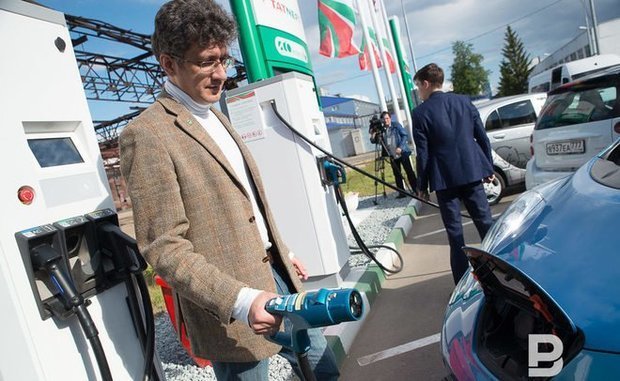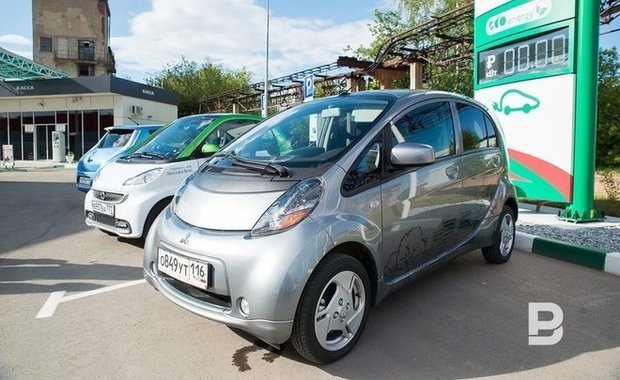Who owns electric charging station market in Tatarstan
Grid Company, UD Group or Innopolis resident?

A new technological market is being formed in Tatarstan — charging stations for electric vehicles. Investors' interest in it increased after the republic adopted a programme for the development of charging infrastructure. It is also stimulated by federal subsidies that are allocated for the installation of domestic charging stations. Who in the republic relies on “green technologies” — read in the review of Realnoe Vremya's analytical service.
By 2024, a network of at least 183 electric charging stations (EVSEs) are to appear in Tatarstan, follows from the programme for the development of charging infrastructure for 2022-2024. Ninety-five new EVSEs will be introduced this year thanks to federal funding: the republic became one of eight pilot regions that received a subsidy from the Ministry of Economic Development of Russia for the development of charging station infrastructure. The Government of Russia compensates the regional operator of EVSEs for 60% of investments in the installation of a domestic station and 30% for the technical connection.
According to the 2charges crowdsourcing platform, which unites owners of electric cars in Russia, 88 EVSEs are already operating in Tatarstan today, and the number of electric cars, according to experts, is already approaching a thousand.

Tatarstan lags behind Moscow and St. Petersburg
There are 4,364 stations in Russia, including 3,679 slow and 688 fast ones. The average charging session time on slow connectors is 1,36 hours, and on fast ones — 54,3 minutes.
The most developed electric charging infrastructure is deployed in Moscow and Moscow Oblast. In terms of the number of slow charging stations among the regions, according to 2charges, the leaders are Moscow Oblast, Moscow, and Krasnodar Krai.
Fast charging is most common in Moscow, Krasnodar Krai, and Primorsky Krai.
Zelenodolsk district is the cradle of charging manufacturers
Two companies under the Non-stop Power (NSP) and E-PROM brands are engaged in the production of charging stations for electric vehicles in Tatarstan.
NSP produces charging stations on the basis of Zelenodolsk Electrotechnical Plant PLC (ZETZ), the main owner of which is UK Energorazvitie PLC, controlled by Ilshat Fardiev. The price of a slow charging station in NSP starts from 60 thousand rubles. The price of a fast one varies from 1,3 to 3,3 million rubles. ZETZ has already installed more than 35 fast charging stations with a capacity of 60 to 180 kW in Tatarstan and more than 20 fast stations with a capacity of 60 to 100 kW throughout Russia, said Nail Galimov, the director of ZETZ. The revenue of ZETZ in 2021, according to SPARK-Interfax, amounted to 894,9 million rubles, net profit — 26,05 million rubles.
The second manufacturer, Promenergo PLC, owned by Fannur Nidiyatov, makes E-PROM charging stations at the Zelenodolsk PSEDA. The production capacity is 180 pieces of fast charging stations a year and 1200 slow charging stations a year. To date, Promenergo has produced more than 50 EVSEs, according to the general director of the company, Sergey Afonin. According to SPARK-Interfax, the company's revenue amounted to 1,06 billion rubles in 2021, net profit — 143,9 million rubles.
In addition to Tatarstan manufacturers, stations with a high degree of localisation in Russia are produced by five more manufacturers: Parus Electro PLC (Moscow), GRPZ JSC, Fora brand (Ryazan, Radioelectronic Technologies concern (KRET) of Rostec State Corporation), Jupiter PLC, Yablochkov brand (St. Petersburg), ZNGA Anod PLC (Perm, a subsidiary of the PSS plant) and NPP Energia (Moscow).

Competition in the market is gaining momentum
Electrifly, a resident of Innopolis special economic zone, was one of the first companies to enter the Tatarstan market in 2017. The company does not have its own charging stations, it works as a provider, providing charging owners with software to monetise their infrastructure. The management of Electrifly PLC has about 300 stations throughout Russia today, of which about 20 are in Kazan.
The largest player in this market is the Grid Company. By the end of the year, it will deploy a network of 95 electric charging stations throughout Tatarstan as part of the federal programme for the development of charging infrastructure. The first two stations have already appeared in Nizhnekamsk and one each in Nurlat and Chistopol. Forty-six EVSEs are to appear in Kazan, 10 — in Almetyevsk and Nizhnekamsk, 16 — in Naberezhnye Chelny, and 10 — along federal and regional highways each. Investments in the project are estimated at 300 million rubles. The cost of charging an electric car at new stations can be up to 15 rubles per kWh.
Developer UD Group is also showing interest in the market, which is developing its own network of Greengy electric charging stations. Today, the network has four EVSEs — in the parking lot of Kazan Mall shopping centre, Gorki Park shopping centre, in Tsarevo-Village residential complex, and in UDACHA Retail Park parking lot. Greengy EVSEs work on the basis of software developed by Touch company from St. Petersburg. UD Group plans to place EVSEs in 40 locations in Tatarstan, primarily in public parking lots of the city, including shopping and business centres, and in the next 10 years to place at least 300 EVSEs throughout Russia.
Tatneft also has its own fast EVSEs (about 15). But for an oil company, this is more of an image direction: charging an electric car at Tatneft is absolutely free. Seven more stations in Kazan were installed by the federal operator Punkt-E, which is present today in 11 regions of Russia and manages a network of 86 EVSEs.
Also in Kazan, there are stations of Touch charging station operators from St. Petersburg (manages a large network of 350 EVSEs in the Russian Federation) and Portal Energy (57 EVSEs in the country). Charging an electric car today is possible through the mobile applications of Tatarstan manufacturers of chargers — NSP and E-PROM.
“This is a new complex market, with new technologies and business processes”
Tatarstan
